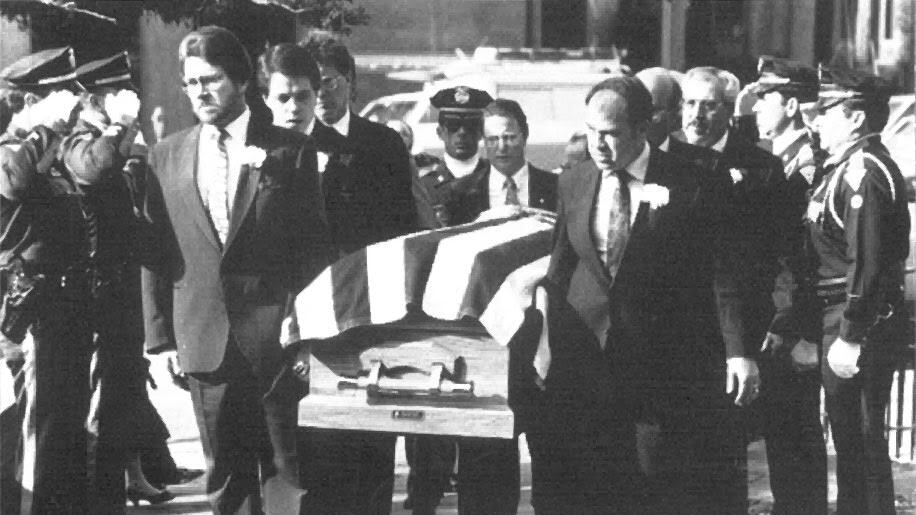U.S. Magistrate Judge John Acosta ruled on April 18 that Frank Gable, convicted in 1991 of the murder of Michael Francke, then the director of the Oregon Department of Corrections, must be released within 90 days unless the state of Oregon decides to try him again.
The ruling is a remarkable twist in one of the most notorious murder cases in Oregon history, one that transfixed the state in late 1980s.
"The trial court erred in excluding evidence of third-party guilt and that trial counsel provided ineffective assistance in failing to assert Gable's federal due process rights in the face of the trial," Acosta wrote in his decision, which was first reported by the Portland Tribune.
"Upon careful review of the voluminous record in this case and considering all of the evidence, both old and new and with due regard for its reliability,t he court concludes that Gable has made a colorable showing of actual innocence sufficient to overcome his procedural default," Acosta concluded. "Although the evidence presented at trial in 1991 resulted in a guilty verdict, the court concludes that it is more likely than not that no reasonable juror would find Gable guilty in light of the totality of all of the evidence uncovered since that time, particularly the newly presented evidence of witness recantations."
Gable is likely now to walk free a little more than 30 years after Michael Francke’s murder.
Only a couple of facts in the case remain beyond dispute: Francke was stabbed to death in the parking lot outside his Salem office early in the evening of Jan. 17, 1989. No murder weapon was ever found. Police first interviewed Gable, a small-time Salem meth dealer, in May 1989 but did not arrest him for Francke's murder until April 1990.
In the 15 months between the murder and Gable's arrest, the case dominated the front pages of the state's newspapers.
The political climate at the time fed suspicions that there was more to the case than a car burglary gone bad. Then-Gov. Neil Goldschmidt had recruited Francke from New Mexico to both clean up and expand Oregon's prison system, which was badly over-crowded and allegedly corrupt.
There were suspicions that Francke's efforts as a change agent put him in the cross-hairs of people who profited from the status quo. The long period between his murder and Gable's arrest only added to speculation about what had happened.
As the murder investigation proceeded, Goldschmidt ordered an investigation of the prison system in 1989.
After a three-month examination of the Department of Corrections, retired Judge John Warden found that "there are reasonable grounds to believe that some officials of the Department of Corrections are involved in significant illegal activities or other wrongdoing."
Warden placed a major caveat on his conclusions. "The single element that has been absent in the responses of some officials in the institutions is candor," he wrote. But the investigation found no link between the alleged corruption and Francke's death.
Police first interviewed Gable in May 1989 but did not arrest him until April 1990.
At Gable's trial in 1991, the state's witnesses were a motley collection of drug dealers and ex-cons who told the court that Gable admitted killing Francke. At least two witnesses testified they'd seen Gable at the crime scene. He was convicted and sentenced to life in prison without parole.
But even after Gable's conviction, skeptics continued to question the state's case. Former Oregonian and Portland Tribune columnist Phil Stanford wrote more than 100 columns about the subject, many with the help of Francke's brother, Kevin, who relocated to Salem and immersed himself in the city's underworld.
Today, Kevin Francke called Acosta's ruling "glorious news."
Stanford said the ruling confirmed what he has long believed. "As has been clear for some time, the only evidence against Gable was manufactured by the state police and the Marion County DA's office. He was sent off to prison to serve a sentence of life without parole because they needed a fall guy," Stanford said in a statement. "What this means, and I doubt if anyone in a position of authority in this state will want to pursue it, is that the Michael Francke murder is still very much an open case."
In 2007, WW published a cover story about a man, Greg Johnson, who claimed he knew Gable was innocent because he'd driven Francke's real killer, whom he said was yet another Salem meth dealer named Tim Natividad (now deceased) to the crime scene.
Related: Should You Trust This Man?
In May 2007, Nell Brown, a federal public defender in Portland, took up Gable's case. Gable had exhausted all his opportunities in the state court system and a federal appeal habeas corpus case wa s his only option—and a very long shot.
But over the next seven years, Brown's investigators methodically tracked down the witnesses who'd testified against Gable, more than half a dozen of them. They all recanted their testimony. In 2014, Brown filed a 189-page brief arguing that Gable had been wrongly convicted.
The Oregon Department of Justice presented counter-arguments and in the past five years, the two sides have buttressed their cases in a process that ended this week with Acosta's decision.
In addition to finding that the court erred in excluding the confession of another potential Francke killer, Johnny Crouse, and faulting Gable's attorney for failing to preserve his rights to due process, Acosta's decision placed blame on the investigators for the tactics they used to get people to testify against Gable.
"Most of the various recantations also share a common theme: the use of similar coercive interrogation tactics and polygraph examinations to secure their incriminating statements," Acosta wrote.
DOJ spokeswoman Kristina Edmunson told the Tribune her agency has not yet decided its course of action. “We are reviewing the opinion and evaluating our options,” Edmundson said.

